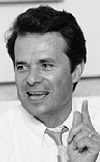|

Michael Jendrzejczyk, 53, Advocate for Asians, Dies Michael Jendrzejczyk, a human rights expert whose advocacy on behalf of victims in Asian nations made him an unlikely power broker in Washington, died on Thursday. He was 53 and lived in Tacoma Park, Md. He died after collapsing during a walk near his office in Washington, his wife, Janet, said. During more than a dozen years at the Washington office of Human Rights Watch, Mr. Jendrzejczyk (pronounced jen-DREE-zick) established himself as the Capitol's leading expert on Asian human rights, routinely testifying before Congress, writing opinion articles for newspapers and promoting his causes. He made his name after the 1989 Chinese military action in Tiananmen Square by encouraging the United States to demand that the victims be protected or, at least, accounted for. He later became prominent in Asian human rights issues like the protection of refugees from North Korea, ending financial assistance to the military government in Burma, connecting human rights to free trade and defending the religious freedom of Tibetans in China and Montagnards in Vietnam. What set him apart from many advocates was his mastery of details of subject as well as his networks of contacts with officials, academics and dissidents he helped protect. The House Democratic leader, Nancy Pelosi of California, said it would be ''difficult to count'' the contributions Mr. Jendrzejczyk made in his promotion of human rights. ''We can point to famous dissidents who have been released from prison because of Mike, but there are tens of thousands of ordinary people, whose names we'll never know, whose lives were improved by his work,'' she said. Mr. Jendrzejczyk, who was born and reared in New Britain, Conn., was a graduate of the University of Hartford. He joined the Army reserve during the Vietnam War but was discharged as a conscientious objector. He taught at a preschool while protesting the Vietnam War and working in the civil rights movement. He became a peace advocate for the Fellowship of Reconciliation in Nyack, N.Y., and for Amnesty International in New York and London. In addition to his wife, he is survived by his sister, Lynn Ashmore of Willimantic, Conn. He joked about the difficulty of pronouncing his surname, telling others not to waste their time learning to say it or spell it, but just to call him Mike J. His easy manner was partly responsible for his wide reach. Establishing himself in the relatively new field of human rights advocacy in Washington, Mr. Jendrzejczyk broke ground as a lobbyist for a cause without any obvious base of support. Susan Osnos, former associate director of Human Rights Watch, said he used information to promote his ideas. ''Over the years he evolved into someone who worked well in Washington, creating two-way streets that are the bread and butter of getting things done, especially when you are advocating things that people aren't naturally interested in,'' she said. His constituents were the Asian dissidents who might have remained faceless without Mr. Jendrzejczyk's interventions. Tibetans, Burmese, Chinese, Indonesians and other dissidents came to rely on him as their most reliable voice in Washington. When the Chinese dissident Liu Qing was released after 11 years in prison, Mr. Jendrzejczyk took him around Washington to explain to policy makers the human consequences of their votes. Today Mr. Liu works for the New York-based Human Rights in China. During the final years of the Clinton administration, Mr. Jendrzejczyk took many dissidents to meet Harold Hongju Koh, a Yale law professor who was then an assistant secretary of state for human rights. Mr. Koh said while Mr. Jendrzejczyk pressed for countless changes in foreign policy to reflect human rights concerns he was never irritated by his demands. ''You start out in a professional relationship with him and end up considering him a dear friend,'' Mr. Koh said. ''He was one of those happy warriors who never let you forget that you are holding a job not for personal gain but for the betterment of American policy.''
|



